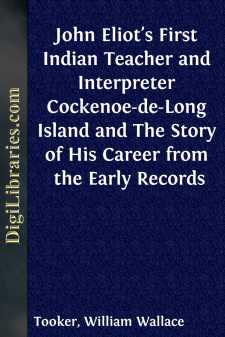Categories
- Antiques & Collectibles 13
- Architecture 36
- Art 48
- Bibles 22
- Biography & Autobiography 813
- Body, Mind & Spirit 142
- Business & Economics 28
- Children's Books 17
- Children's Fiction 14
- Computers 4
- Cooking 94
- Crafts & Hobbies 4
- Drama 346
- Education 46
- Family & Relationships 57
- Fiction 11829
- Games 19
- Gardening 17
- Health & Fitness 34
- History 1377
- House & Home 1
- Humor 147
- Juvenile Fiction 1873
- Juvenile Nonfiction 202
- Language Arts & Disciplines 88
- Law 16
- Literary Collections 686
- Literary Criticism 179
- Mathematics 13
- Medical 41
- Music 40
- Nature 179
- Non-Classifiable 1768
- Performing Arts 7
- Periodicals 1453
- Philosophy 64
- Photography 2
- Poetry 896
- Political Science 203
- Psychology 42
- Reference 154
- Religion 513
- Science 126
- Self-Help 84
- Social Science 81
- Sports & Recreation 34
- Study Aids 3
- Technology & Engineering 59
- Transportation 23
- Travel 463
- True Crime 29
John Eliot's First Indian Teacher and Interpreter Cockenoe-de-Long Island and The Story of His Career from the Early Records
Categories:
Description:
Excerpt
COCKENOE-DE-LONG ISLAND.
The victory of Captain John Mason and Captain John Underhill over the Pequots on the hills of Mystic, in 1637, in its results was far greater than that of Wellington on the field of Waterloo. This fact will impress itself in indelible characters on the minds of those who delve into the historical truths connected with the genesis of our settlements, so wide spreading were the fruits of this victory. As the native inhabitants of the eastern part of Long Island and the adjacent islands were subjects of, and under tribute to, these dreaded Pequots, they were more or less disturbed by the issues of the after conflicts which ensued in hunting out the fleeing survivors. But as two of the Long Island Sachems, Yoco, the Sachem of Shelter Island, and Wyandanch, the Sachem of Montauk, through the mediation of their friend Lion Gardiner came three days after the fight, and placed themselves under the protection of the victors, and, as the latter with his men assisted Captain Stoughton during the finale at the "Great Swamp," beyond New Haven, they did not feel the effects so severely as did the immediate allies of the Pequots. Many of the younger Indians captured in this war, especially those taken in Connecticut, were carried to Boston, and there sold into slavery, or distributed around the country into a limited period of servitude—a period generally terminating when the individual so bound had arrived at the age of twenty-five.
Among those so captured and allotted was a young Indian of Long Island, who became a servant in the family of a prominent citizen of Dorchester, Mass., a sergeant in the same war, and therefore possibly his captor. This young Indian having been a native of Long Island, and on a visit, was perhaps a reason why he was detained in the colony, for the young male Pequots, we are told, were all expatriated.
In proof of these findings of fact we have the testimony of the Rev. John Eliot, than whom no one is better known for his labors in behalf of the spiritual welfare of the Indians of eastern Massachusetts, and for his works in their language, including that monumental work which went through two editions, Eliot's Indian Bible. It is thought that Eliot began his study of the Indian language about 1643, but it is possible that he began much earlier. In a letter dated February 12, 1649 (2-12-'48), he wrote:
"There is an Indian living with Mr. Richard Calicott of Dorchester, who was taken in the Pequott warres, though belonging to Long Island. This Indian is ingenious, can read, and I taught him to write, which he quickly learnt, though I know not what use he now maketh of it. He was the first that I made use of to teach me words, and to be my interpreter."
FAC-SIMILE OF THE TITLE-PAGE OF THE PRIMER OF 1669.At the end of his Indian grammar (printed at Cambridge in 1666) Mr. Eliot gives us an account of his method of learning the language and some more information in regard to this young Long Island Indian. He writes: "I have now finished what I shall do at present; and in a word or two to satisfie the prudent Enquirer how I found out these new ways of grammar, which no other Learned Language (so farre as I know) useth; I thus inform him: God first put into my heart a compassion over their poor souls, and a desire to teach them to know Christ, and to bring them into his kingdome. Then presently I found out, (by Gods wise providence) a pregnant witted young man, who had been a servant in an English house, who pretty well understood our Language, better than he could speak it, and well understood his own Language, and hath a clear pronunciation; Him I made my Interpreter....


